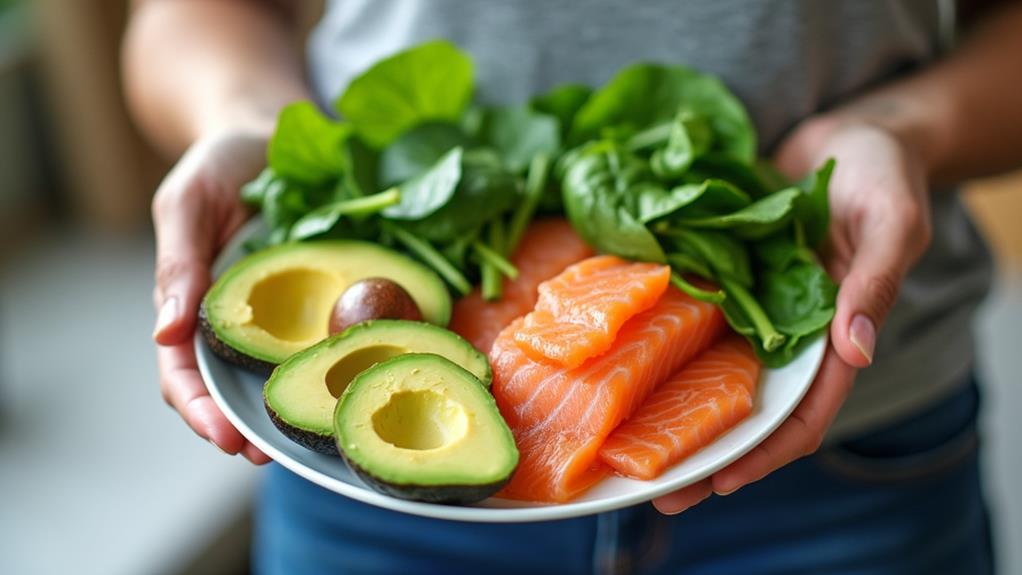
For those adhering to a ketogenic diet, it is vital to maintain a daily intake of 20 to 50 grams of net carbs to achieve and sustain ketosis. Net carbs are calculated by subtracting fiber and half of the sugar alcohols from total carbohydrates. This low-carb intake prompts the body to burn fats for energy, resulting in potential weight loss and improved blood sugar control. Monitoring net carbs, distinguishing them from total carbs, and utilizing nutrition labels for precise tracking are essential steps. Understanding these guidelines will greatly enhance your ketogenic journey and dietary success.
Key Takeaways
- Net carbs for ketosis typically range between 20 to 50 grams per day, with 20 grams being a common target.
- Calculate net carbs using the formula: Net Carbs = Total Carbs – Fiber – (0.5 * Sugar Alcohols).
- Monitoring net carb intake daily is crucial for maintaining ketosis and achieving dietary goals.
- Low net carb foods include leafy greens, high-fat dairy, nuts, seeds, and low-carb fruits like berries.
- Excessive protein intake can disrupt ketosis, so maintain a macronutrient ratio of 70% fat, 20% protein, and 10% carbs.
Understanding Net Carbs
Understanding net carbs helps avoid common net carb misconceptions, such as the erroneous idea that all carbohydrates count equally toward the daily limit.
Net carbs are calculated by subtracting fiber and half of sugar alcohols from total carbohydrates, reflecting the digestible carbs that impact ketosis. This calculation is vital as the recommended daily net carb limit for maintaining ketosis is typically between 20 to 50 grams.
Recognizing the difference between ketosis and ketoacidosis is also vital for safe ketogenic diet practice.
Additionally, understanding net carbs helps avoid the misconception that keto allows unlimited consumption of certain foods. Fiber, for instance, does not contribute to net carb counts because it is indigestible and does not spike blood sugar levels.
Recognizing the role of fiber sources, such as vegetables and whole grains, allows for better dietary planning and successful adherence to a ketogenic lifestyle.
Additionally, sugar alcohols, like erythritol, have a lower impact on blood sugar and are partially counted in the net carb calculation.
Monitoring net carb consumption is therefore essential for achieving weight loss and health goals on a ketogenic diet.
Total Carbs vs. Net Carbs
Understanding the distinction between total carbs and net carbs is crucial for anyone adhering to a ketogenic diet. Total carbs encompass all carbohydrates present in food, including sugars, fiber, and sugar alcohols. In contrast, net carbs represent the carbohydrates absorbed by the body, which directly impact blood sugar levels. This differentiation is critical for making informed dietary adjustments and managing ketogenic dietary adherence.
Net carbs are calculated using the following formula:
Net Carbs = Total Carbs – Fiber – (0.5 * Sugar Alcohols)
This calculation accounts for indigestible fiber and the reduced effect of sugar alcohols on blood glucose. For those on a ketogenic diet, limiting net carb intake to 20-50 grams per day is essential to maintain ketosis, while total carbs may be higher due to the fiber content in various carb sources.
| Carb Component | Description |
|---|---|
| Total Carbs | All carbohydrates in food, including fiber and sugar |
| Fiber | Indigestible part of carbs, subtracted from total carbs |
| Sugar Alcohols | Partially absorbed, 50% impact on blood sugar, subtracted |
| Net Carbs | Absorbed carbs affecting blood sugar (Total – Fiber – SA) |
Misunderstanding these concepts can lead to exceeding daily carb limits, hindering ketosis maintenance. As a result, distinguishing between total and net carbs when reading nutrition labels is indispensable for effective carbohydrate management on a ketogenic diet.
Calculating Net Carbs
To accurately calculate net carbs, use the formula: Net Carbs = Total Carbs – Fiber – (0.5 * Sugar Alcohols), which is vital for determining the carbs your body can actually absorb.
Understanding this formula helps in identifying how many carbohydrates you are consuming, which is essential for maintaining keto adherence.
Utilizing nutrition labels effectively can help in identifying total carbs, fiber, and sugar alcohol content, making it easier to track and monitor daily intake.
Adhering to the recommended net carb limit of up to 50 grams per day is important for maintaining ketosis and achieving the metabolic benefits of the ketogenic diet.
Net Carb Formula
In the domain of ketogenic dieting, accurately calculating net carbs is essential for maintaining ketosis and achieving dietary goals. The net carb formula, Net Carbs = Total Carbs – Fiber – (0.5 ** Sugar Alcohols), is vital for determining the carbohydrates that impact blood sugar levels. This formula helps dispel common net carb misconceptions and net carb myths by focusing on carbs that are digested and absorbed by the body, rather than total carbohydrates, which include non-digestible components.
For instance, consider a food item with 20 grams of total carbs, 8 grams of fiber, and 5 grams of sugar alcohols. The net carbs can be calculated as follows:
| Component | Amount (grams) |
|---|---|
| Total Carbs | 20 |
| Fiber | 8 |
| Sugar Alcohols | 5 |
| Net Carbs | 7 |
The calculation is 20 – 8 – (0.5 **5) = 7 grams of net carbs. Monitoring net carbs is pivotal in maintaining ketosis, with a daily limit of up to 50 grams recommended for most individuals on the keto diet. Consequently, understanding and applying the net carb formula is indispensable for effective meal planning and adherence to the ketogenic lifestyle.
Utilizing Nutrition Labels
When commencing on a ketogenic diet, accurately interpreting nutrition labels is paramount for effective net carb calculation. Nutrition labels are a critical tool in this process, as they provide essential data on total carbohydrate content, including sugars, fiber, and sugar alcohols.
To determine net carbs, use the formula: Net Carbs = Total Carbs – Fiber – (0.5 Sugar Alcohols). For instance, if a food item lists 20g of total carbs, 8g of fiber, and 5g of sugar alcohols, the net carbs would be 7g (20g – 8g – (0.5 5g)).
Effective label reading is essential for accurate net carb tracking, and particular attention must be paid to serving sizes. The nutritional values indicated are typically based on a specific portion, which means consuming multiple servings will proportionately increase your net carb intake.
For example, if the serving size is 1 cup and you consume 2 cups, you must double the net carb value calculated.
Maintaining ketosis necessitates diligent monitoring of net carbs, often limiting intake to 20-50 grams per day based on individual goals and activity levels. Understanding and utilizing nutrition labels effectively is essential for staying within these limits.
Monitoring Daily Intake
Accurate monitoring of daily net carb intake is essential for anyone committed to a ketogenic diet. To calculate net carbs, the formula Net Carbs = Total Carbs – Fiber – (0.5 * Sugar Alcohols) must be utilized, ensuring all nutritional components are considered.
Adhering to the recommended daily net carb limit of 20-50 grams, with a common target of around 20 grams, is critical for maintaining ketosis and achieving effective weight loss.
Daily tracking of net carbs not only supports ketosis but also aids in better meal planning and carb awareness. By consistently recording your intake, you can identify hidden carbs in processed foods that might otherwise go unnoticed.
This meticulous approach helps avoid exceeding your daily limit, which could disrupt ketosis and stall your weight loss progress.
Implementing tools such as apps or food diaries can greatly enhance the accuracy of your daily tracking. These resources simplify the process of logging your net carbs, ensuring you remain within the desired range.
Consequently, employing consistent tracking methods and maintaining carb awareness are essential strategies for anyone devoted to the ketogenic lifestyle.
Low Net Carb Foods
Steering through the keto diet can be simplified by focusing on low net carb foods, which form the cornerstone of this high-fat, low-carbohydrate eating plan.
Key foods to include are fresh meats and fish, such as turkey, chicken, and salmon, all of which are excellent protein sources and contain zero carbs.
Leafy greens and non-starchy vegetables, like spinach, kale, broccoli, and cauliflower, offer nutrient-dense options with very low net carbs, typically ranging from 1 to 4 grams per serving.
Cauliflower, for instance, is extremely versatile and rich in vitamins C and K.
Avocados stand out as a low net carb fruit, providing about 1.83 grams of net carbs per 100 grams, along with healthy fats and fiber.
Nuts and seeds, such as Brazil nuts (4.24 grams of net carbs) and flaxseeds (1.58 grams), are also beneficial when consumed in moderation.
Top Low Net Carb Foods:
- Leafy Greens and Non-Starchy Vegetables: Spinach, kale, broccoli, and cauliflower.
- Healthy Fats: Avocados and nuts like Brazil nuts and flaxseeds.
- Low Carb Fruits and Berries: Raspberries and other berries, with approximately 5.44 grams of net carbs per 100 grams.
Incorporating these foods into keto snacks, low carb desserts, and meal prepping guarantees balanced nutrient timing and effective portion control, vital for maintaining ketosis.
Experimenting with various recipe ideas and keto-friendly beverages can make the diet more enjoyable and sustainable.
Benefits of the Keto Diet

The keto diet offers several notable benefits, including significant weight loss, enhanced blood sugar control, and improved mental clarity.
By shifting the body's primary energy source from carbohydrates to fats, individuals often experience effective fat loss and better management of type 2 diabetes through reduced insulin levels.
Additionally, the brain's use of ketones as an energy source can lead to increased focus and cognitive function.
The diet also promotes satiety by reducing ghrelin levels, which helps in appetite regulation.
This shift can lead to improved cardiovascular health and lower blood pressure as well.
Weight Loss Effects
Frequently noted for its efficacy, the ketogenic diet can lead to substantial weight loss by shifting the body's primary energy source from carbohydrates to fats. By limiting carb intake to approximately 20-50 grams of net carbs per day, the diet promotes fat oxidation, making it a viable option for those aiming to lose weight.
Numerous studies have demonstrated that individuals on a ketogenic diet may lose 2-3 times more weight than those on low-fat diets, particularly within the first six months.
Key Benefits of Weight Loss on the Keto Diet:
- Enhanced Fat Burning: By prioritizing fat as an energy source, the body increases its efficiency in burning fat stores, contributing to significant weight loss.
- Appetite Regulation: The ketogenic diet has been shown to reduce hunger hormones, making it easier for individuals to adhere to their caloric intake goals and avoid common weight loss plateaus.
- Improved Metabolic Health: Long-term adherence to the keto diet can enhance metabolic health, enabling sustained weight loss and maintenance.
Keto success stories frequently highlight these benefits, underscoring the diet's potential to achieve and maintain substantial weight loss.
Blood Sugar Control
Shifting focus from weight loss benefits, another considerable advantage of the ketogenic diet lies in its ability to improve blood sugar control. By markedly reducing carbohydrate intake to around 20-50 grams of net carbs per day, the keto diet fosters keto adaptations, where the body shifts from using glucose to utilizing fat as its primary energy source. This metabolic change helps stabilize blood sugar levels, a critical aspect for those managing diabetes.
Studies have demonstrated that individuals with type 2 diabetes often experience enhanced blood sugar management and reduced reliance on medications following the adoption of a keto diet. The reduction in carbohydrate intake leads to lower glucose levels and decreased insulin resistance, thereby improving insulin sensitivity.
Additionally, research indicates a notable decrease in HbA1c levels, a key marker for long-term blood sugar control, among those adhering to a ketogenic dietary regimen.
Furthermore, the decreased insulin production associated with the keto diet helps alleviate symptoms and reduce risks related to hyperglycemia, thereby promoting overall metabolic health.
These findings underscore the potential of the ketogenic diet as an effective strategy for improving blood sugar control and enhancing insulin sensitivity, particularly for individuals grappling with diabetes.
Improved Mental Clarity
Many individuals adhering to a ketogenic diet report marked improvements in mental clarity and focus, a benefit that is largely attributed to the brain's efficient utilization of ketones as a primary energy source instead of glucose.
This shift in energy supply can have profound cognitive benefits, particularly for those seeking to enhance brain health.
Key Cognitive Benefits of the Keto Diet:
1. Enhanced Cognitive Function: Research indicates that the ketogenic diet may improve cognitive function and reduce symptoms of conditions such as Alzheimer's disease by providing a steady supply of energy to brain cells.
This continuous energy flow helps optimize mental performance and protect against neurodegenerative diseases.
2. Stabilized Blood Sugar Levels: The reduction in carbohydrate intake and consequent stabilization of blood sugar levels can lead to fewer energy crashes, resulting in improved concentration and mental performance throughout the day.
This stabilization helps in maintaining a more consistent mental state, avoiding the common pitfalls of brain fog and fatigue.
3. Improved Mental Performance: A study found that participants on a ketogenic diet experienced improved mental performance in tasks requiring sustained attention and cognitive flexibility compared to those on a high-carb diet.
These findings underscore the potential of the ketogenic diet to enhance overall cognitive resilience and sharpness.
Common Keto Mistakes
One of the most significant pitfalls individuals encounter on the keto diet is consuming an excessive amount of protein, which can impair the body's ability to achieve and sustain ketosis. This common keto misconception stems from the belief that high protein intake supports muscle maintenance, but it can actually convert to glucose through gluconeogenesis, disrupting ketosis.
To avoid these protein pitfalls, it is essential to adhere to a balanced macronutrient ratio: approximately 70% fat, 20% protein, and 10% carbohydrates. Diversifying protein sources instead of relying solely on processed meats can also prevent nutrient imbalances.
Another frequent error is neglecting to track daily net carb intake. Exceeding the recommended 20-50 grams of net carbs can prevent ketosis and hinder weight loss. Additionally, insufficient fat intake can leave the body struggling to adapt to burning fat for fuel, resulting in fatigue and potential weight gain.
Maintaining electrolyte balance is also important to prevent side effects like fatigue and cramps, often caused by lower insulin levels leading to increased sodium excretion. Incorporating sodium-rich foods or broth can mitigate these symptoms.
Frequently Asked Questions
How Many Net Carbs Should I Eat on Keto?
To maintain ketosis, the recommended keto carb limits are typically 20 to 50 grams of net carbs daily. Net carbs calculation involves subtracting fiber and half of sugar alcohols from total carbohydrates, essential for effective dietary adherence and results.
How Many Net Carbs Will Kick You Out of Keto?
The keto carb limits vary but generally, consuming over 50 grams of net carbs can disrupt ketosis. Net carbs explained: this refers to total carbohydrates minus fiber and certain sugar alcohols, essential for maintaining ketosis.
Is 30 Net Carbs Too Much for Keto?
Thirty net carbs may not be excessive for keto, depending on individual tolerance and metabolic flexibility. While 20-50 grams is standard, monitoring personal responses and adjusting intake is essential to maintaining ketosis effectively.
How Many Carbs Should I Eat on a Strict Keto Diet?
On a strict keto diet, it is recommended to consume between 20 to 50 grams of net carbs daily. To calculate net carbs, subtract fiber and half of the sugar alcohols from total carbs, focusing on keto carb sources.
Conclusion
The ketogenic diet's efficacy hinges on the meticulous monitoring of net carbohydrate intake, distinguishing it from total carbohydrates by subtracting fiber and certain sugar alcohols. Emphasis on low net carb foods is paramount to maintaining ketosis, thereby optimizing metabolic outcomes. Understanding these principles, alongside the benefits and common pitfalls of the keto diet, can greatly enhance adherence and success. A strategic, evidence-based approach is essential for leveraging the ketogenic diet's potential health benefits.










No Comments